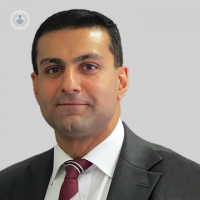Bloating: the sign of a medical condition?
Autore:Bloating is one of the most common complaints that gastroenterologist Dr Rehan Haidry sees in patients who visit his clinics. It is often either transient or in some patients, it can be sustained and impact quite significantly on their quality of life.
It causes not just abdominal discomfort but often visible distension that can be aesthetically unpleasing to look at. Here Dr Haidry explains the some of the common causes of bloating and whether it’s the result of an underlying medical condition.

Why is my stomach bloated all of the time?
The most likely cause of bloating is either a build-up of gas that is being produced in response to something that you are eating and drinking, or in response to a self-limiting infection and buildup of bacteria in the small bowel.
In the majority of cases the bloating is benign and of no great concern. The most important thing to do in patients with sustained abdominal discomfort and bloating is to make sure that they seek medical advice early to ensure that there are no sinister causes.
What can stomach bloating be a sign of?
In the majority of patients with stomach bloating there is no obvious sinister pathology to be concerned about. I see a lot of patients in my clinic with bloating and often they have been either labelled with irritable bowel syndrome (IBS) or have self-diagnosed themselves with IBS.
IBS is not a term I like to use personally as I feel that this label can often unsettle and confuse patients and can sometimes lead to rather indifferent approaches to diagnosis and management. Once basic investigations have been carried out to ensure that there is no worrying cause for the bloating, the most likely cause is a build-up of gas and air within either the large colon or the small bowel, which can cause abdominal distension and pain.
In patients who have been historically labelled with IBS, I prefer to use the term functional bowel disease. Bloating is often a result of a disorder in the physical function of the bowel where it is either not clearing the natural gas that has built up in response to fermentation of foods by our natural bacteria, or a result of an overgrowth of certain bugs and bacteria within the small bowel. If one considers the bowel as a complex and dynamically moving and functioning organ that is working to transport food and nutrients down along its length to the colon, then we can compartmentalise symptoms depending on where along its length this function becomes a disorder.
One of the most common causes of bloating that I see is due to a condition called small intestinal bacterial overgrowth (SIBO). This is a condition where, for a multitude of reasons, there is an overgrowth of bacteria in the middle compartment (the small bowel). Normally the small bowel is an area devoid of any bacteria present. In the human gastrointestinal tract the majority of our normal colonic flora live in our large colon.
In conditions where the environment within the small bowel changes, it can be hospitable to an overgrowth of these normal gut floras. This can be due to changes to the environment and function of the small bowel because of either slow transit, secondary to painkillers, acid suppression medications, antibiotic use or acute GI infections. As a result of this, these bacteria flourish by feeding off small fermentable sugars that are abundant in our diets, such as fructose, lactose, sucrose, small fermentable carbohydrates.
Their by-products are gas and it's this gas that causes the distension and bloating but can also have other side effects such: as diarrhoea, volatile bowel habits, burping and flatulence. It can also cause extracolonic manifestations such as lethargy, mental fatigue and often skin manifestations. There is now global consensus to term this condition SIBO, which can be easily diagnosed and, in the majority of cases, managed with a protocolled regiment.
How does a doctor investigate bloating?
The most important thing to do in patients with sustained or troubling symptoms of bloating is to ensure that there is no obvious, sinister reversible pathology. This can be done by taking a detailed history, examining the patient and also with routine noninvasive investigations, such as blood samples or a simple ultrasound scan.
Once we are certain there is no worrying cause, the most effective way of diagnosing functional bowel disease and midgut dysbiosis or SIBO is with a simple breath test. This involves giving the patient a drink of something called lactulose. They then breathe into a small machine which measures their gas production from within the small bowel and also the large bowel.
Essentially this test is mimicking a scenario where the patient eats and drinks something with sugars in and it causes gas production. This test can be extremely useful, not only in indicating the presence of SIBO but it also tells us a lot about the transit of the gut and also wherein the bowel the gas is being produced. This depends on the time at which we see peaks in gas we call hydrogen or methane.
Furthermore, this breath test will tell us if they have hydrogen or methane predominant SIBO. Both conditions have very subtle differences in terms of clinical symptoms but also how we manage patients with treatments afterwards. With the results of the breath test I normally sit with the patient and go through the options with what one can do to improve their symptoms.
Do not hesitate to book an appointment with Dr Haidry if you're looking to relieve your persistent symptoms of bloating.


